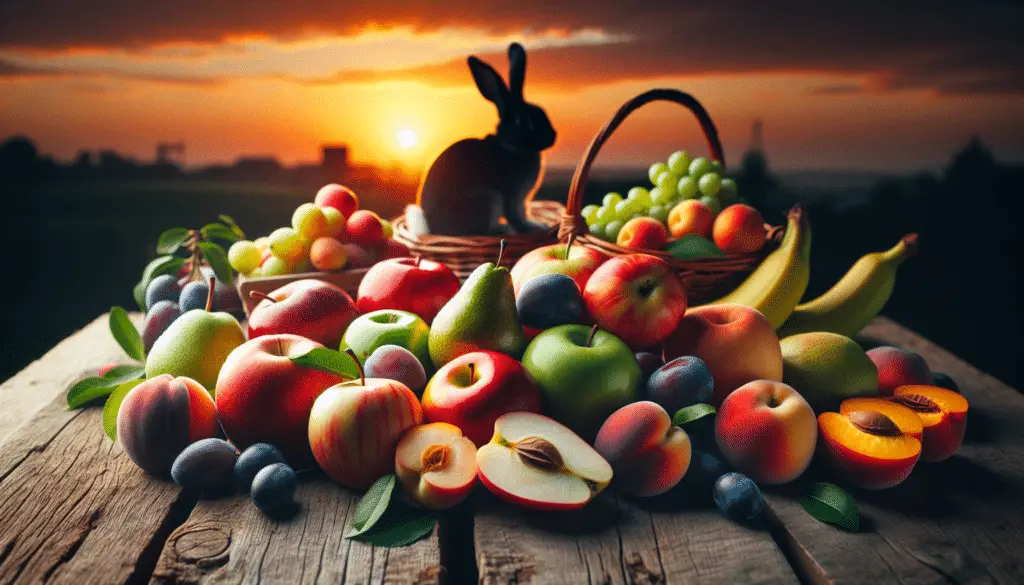What Fruits Are Safe for Rabbits?
Table of Contents
ToggleIf you’re a rabbit owner, you might be wondering what fruits are safe for your furry friend to eat. Many fruits are safe for rabbits to consume and can be a delightful treat for them.
Rabbits can safely eat apples, blueberries, strawberries, bananas, raspberries, and pears.
These fruits are not only safe but can provide essential nutrients and a tasty snack that will likely be met with enthusiasm by your bunny.
Let’s delve deeper into these fruits, their benefits, and how to safely introduce them into your rabbit’s diet.
Apples: A Crunchy Delight
Apples are a popular choice when it comes to rabbit-friendly fruits. They are sweet, juicy, and contain essential vitamins like vitamin C.
When offering apples to your rabbit, make sure to remove the seeds and core, as they contain cyanide, which can be harmful.
Remember to introduce any new food gradually and observe your rabbit for any adverse reactions.
Blueberries: Packed with Antioxidants
Blueberries are small, sweet, and full of antioxidants. These berries can be a fantastic treat for rabbits, and their size makes them easy to feed.
Blueberries are low in calories and high in fiber, making them an excellent choice for health-conscious rabbit owners.
Be sure to wash the blueberries thoroughly before offering them to your rabbit to remove any pesticides.
Strawberries: Sweet and Nutritious
Strawberries are another safe fruit option for rabbits. They are rich in vitamin C and can add variety to your rabbit’s diet.
Like blueberries, strawberries should be washed thoroughly. It’s also a good idea to cut them into smaller pieces to avoid choking hazards.
Giving strawberries occasionally can provide a delightful change from their regular food.
Bananas: A Rich Source of Potassium
Bananas are an excellent fruit for rabbits but should be given in moderation due to their high sugar content.
They are rich in potassium and other vital nutrients. Slices of banana can be a perfect reward for good behavior.
Be careful not to overfeed bananas, as too much sugar can lead to obesity and digestive issues.
Raspberries: A Tasty Treat
Raspberries, with their unique flavor, are safe for rabbits and make a lovely treat.
They contain fiber, vitamins, and antioxidants, which can contribute positively to your rabbit’s overall health.
Like other berries, be sure to introduce raspberries slowly and observe how your rabbit’s digestive system reacts.
Pears: Juicy and Refreshing
Pears can be a refreshing treat for your rabbit. They are high in fiber and contain essential vitamins.
Make sure to remove the seeds and core before feeding pears to your rabbit. Slice them into small pieces to ensure easy consumption.
Monitor the portion size, as too much fruit can cause digestive disturbances.
How to Feed Fruits to Rabbits
Fruits should always be an occasional treat in a rabbit’s diet and not a primary food source. Here’s how you can safely feed fruits to your rabbit:
- Always wash fruits thoroughly to remove any pesticides.
- Start with a small portion and observe for any adverse reactions.
- Remove seeds, cores, and pits, as these can be toxic.
- Limit fruit to small treats to avoid digestive issues and obesity.
Introducing fruits gradually will help assess whether your rabbit enjoys and tolerates the new treat.
Potential Issues and Precautions
While fruits can be a wonderful addition to your rabbit’s diet, there are some potential issues to be aware of:
Overfeeding
- Fruits are high in sugar and can lead to obesity if given in excess.
- Overfeeding fruits can cause digestive issues such as diarrhea.
Allergic Reactions
- Although rare, some rabbits may have allergies to certain fruits.
- Always introduce new fruits slowly and watch for any signs of reactions.
If you notice any unusual behavior or symptoms, consult a veterinarian promptly.
Products That Can Help
If you’re looking for products that can assist with feeding fruits to your rabbits, there are some great options available. These products can make the process easier and ensure your rabbit gets the best care.
Treat Dispensing Toys
Treat dispensing toys can be an excellent way to feed fruits to your rabbit. These toys not only make feeding fun but also encourage your rabbit to be more active.
The Kaytee Vege-T-Bowl is a popular choice among rabbit owners.
Pros
- Encourages natural foraging behavior.
- Provides mental stimulation.
- Easy to clean.
Cons
- Not suitable for all types of fruits.
- Some rabbits may not initially understand how to use it.
Find This and More on Amazon
Fruit Slicing Tools
To make the preparation process more efficient, consider investing in fruit slicing tools. These tools can help you quickly and safely cut fruits into appropriate sizes.
The OXO Good Grips Apple Slicer is well-rated for its durability and ease of use.
Pros
- Stainless steel blades.
- Comfortable non-slip grip.
- Easy to clean.
Cons
- Limited to certain fruit sizes.
- Can be sharp; handle with care.
Find This and More on Amazon
Understanding Rabbit Nutrition
Beyond fruits, rabbits need a balanced diet to thrive. Their main diet should consist of hay, fresh vegetables, and specially formulated rabbit pellets.
Hay should make up the bulk of a rabbit’s diet, providing essential fiber for their digestive system.
Leafy greens such as kale, romaine lettuce, and parsley are also excellent additions.
Fruits should only complement the main diet and not replace these primary components.
Common Questions About Rabbit Diets
Can rabbits eat citrus fruits?
While some rabbits may enjoy citrus fruits, it’s best to avoid them. The acidity can upset a rabbit’s stomach.
How often should I feed fruits to my rabbit?
Fruits should be given as an occasional treat, typically a few times a week, and in small portions.
Are dried fruits safe for rabbits?
Dried fruits are usually not recommended due to their high sugar content and reduced water content.
What should I do if my rabbit overeats fruits?
Monitor your rabbit closely for any signs of digestive upset. If you notice any issues, contact your veterinarian right away.
Are there any fruits that are toxic to rabbits?
Yes, fruits like cherries, plums, and peaches can be harmful due to their pits. Always remove any seeds or pits before feeding fruits to your rabbit.
Conclusion and Content area 2 of 2
Frequently Asked Questions about Fruits for Rabbits
Can rabbits eat grapes?
Yes, but in moderation. Grapes can be a sweet treat, but due to their high sugar content, they should be given sparingly.
What about melon varieties, like watermelons or cantaloupes?
Rabbits can enjoy the flesh of melons, including watermelons, cantaloupes, and honeydews. However, seeds and rinds should be avoided.
Are apples safe for all rabbit breeds?
Yes, apples are generally safe for all rabbit breeds as long as the seeds and core are removed.
Can baby rabbits eat the same fruits as adult rabbits?
It’s best to wait until rabbits are around 12 weeks old before introducing fruits. Their digestive systems are very sensitive when they are young.
Feeding Fruits to Different Rabbit Breeds
Rabbits have varying dietary needs based on their breed and size. Let’s explore how different breeds might benefit from fruits.
Mini Rex rabbits, for example, have sensitive stomachs. Introduce fruits like blueberries and apples gradually and in small amounts.
Flemish Giant rabbits, being much larger, can handle slightly larger portions, but the same caution about sugar and overfeeding applies.
If you have a Netherland Dwarf, fruits should be especially limited due to their small size and higher susceptibility to obesity.
European rabbits, especially those that are domesticated, can enjoy apples and strawberries but monitor their weight closely.
Remember to adjust the portion sizes according to the specific needs and size of your rabbit breed.
Product Focus: Kaytee All Natural Timothy Hay
When adding fruits to your rabbit’s diet, balance is key. Ensure they have a primary source of nutrition from high-quality hay.
The Kaytee All Natural Timothy Hay is highly recommended among rabbit owners.
Pros
- High in fiber, promoting healthy digestion.
- Free from artificial colors and preservatives.
- Provides essential nutrients and aids in dental health.
Cons
- Can be dusty if not stored properly.
- Some rabbits may prefer a different texture or type of hay.
Find This and More on Amazon
Understanding How Fruits Fit into a Rabbit’s Lifestyle
Rabbits are natural foragers, so offering a variety of fruits can enrich their lives.
In the wild, rabbits would seek out seasonal fruits and vegetables to add to their diet.
Start by offering small pieces of fruit and observe your rabbit’s reactions and preferences.
Rabbits often enjoy the process of finding and eating fruits, which can also stimulate their mental acuity and physical activity.
Common Misconceptions About Feeding Fruits to Rabbits
There are many myths about what fruits are safe for rabbits. It’s essential to separate fact from fiction.
Some believe that all fruits are off-limits due to their sugar content. However, in moderation, fruits can be a beneficial part of a rabbit’s diet.
Others think that if a fruit is safe for humans, it’s safe for rabbits too. This is not always true, and certain fruits like cherries and peaches can be harmful.
By understanding which fruits are beneficial and which are not, you can make better dietary choices for your rabbit.
Real-World Tips from Rabbit Owners
Many rabbit owners have shared creative ways to incorporate fruits into their rabbit’s diet.
One popular method is freezing small pieces of fruit during summer months. This can help your rabbit stay cool and enjoy a refreshing treat.
Another tip is to mix small bits of fruit with your rabbit’s hay, making the foraging experience more exciting.
Rotating different fruits each week can keep your rabbit interested and prevent boredom with their diet.
Related Questions and Concerns
Are fruit peels safe for rabbits?
Most fruit peels, like apple peels, can be safe but should be given in small amounts and washed thoroughly.
Can I use fruits to train my rabbit?
Yes, small fruit pieces can be excellent training rewards. The sweetness can motivate your rabbit to learn new behaviors.
Feeding appropriate fruits in moderation can add variety and excitement to your rabbit’s diet.
Paying attention to your rabbit’s individual preferences and reactions will ensure a happy and healthy bunny.



